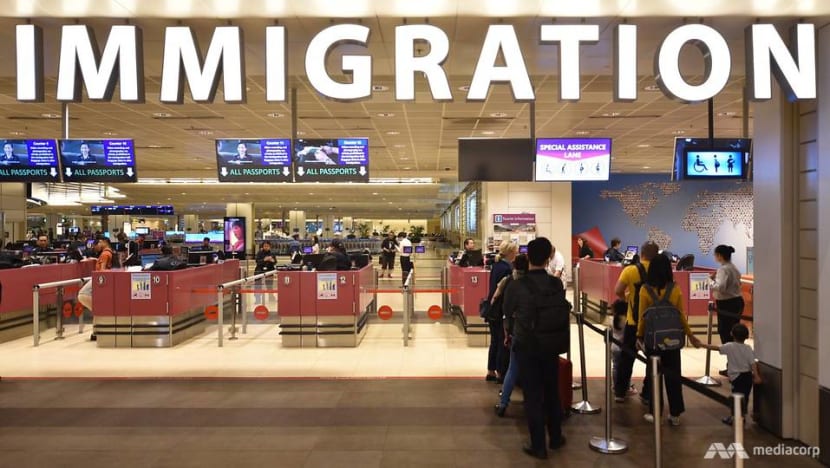Visa regime not ‘foolproof’ in keeping unwanted characters away from Singapore: MHA
No visa regime will “completely weed out” undesirable visitors or stop them from committing crimes in Singapore, said Minister of State for Home Affairs Sun Xueling.

Immigration counters at Changi Airport Terminal 2. (File photo: Jeremy Long)

This audio is generated by an AI tool.
SINGAPORE: A visa regime is not a foolproof way to keep unwanted characters away from Singapore, said Minister of State for Home Affairs Sun Xueling on Monday (Sep 9).
While a visa regime enables the government to screen individuals before they travel to Singapore, no regime will “completely weed out” undesirable visitors or stop them from committing crimes here, she added.
Ms Sun, who is also Minister of State for Social and Family Development, was responding to a parliamentary question from Non-constituency Member of Parliament (NCMP) Leong Mun Wai, on whether the number of Social Visit Pass holders from China who have been arrested has increased since a 30-day visa exemption arrangement for Chinese passport holders was implemented in February.
He also asked whether allowing foreigners to enter via automated lanes at Changi Airport since May has increased the risk of people who “are not bona fide travellers” entering Singapore.
Ms Sun noted that Mr Leong’s question may be related to the recent spate of housebreaking cases in private residential estates, which the police have linked to foreign syndicates involving Chinese nationals.
Three Chinese nationals have been arrested and charged in court so far, while the police are trying to locate another 14 who are currently not in Singapore. The suspects are believed to be transient travellers who had entered Singapore as Social Visit Pass holders, usually one to two days before committing the offence, said the police in August.
There has been no increase in the number or percentage of short-term visitors from China arrested in Singapore since the mutual visa exemption arrangement was implemented in February this year, said Minister of State for Home Affairs Sun Xueling. Replying to a Parliamentary question on Monday (Sep 9), she highlighted the risk-based, multi-layered approach of the Immigration and Checkpoints Authority (ICA) to assess foreign travellers. Ms Sun said its systems have been upgraded and the checks have become more robust. She pointed out that the percentage of travellers who are refused entry into Singapore has in fact increased as ICA’s checks are now done further upstream with the more extensive use of technology. Ms Sun told the House that the mutual visa exemption arrangement with China was carefully assessed and weighed - that the risks are manageable and that the economic and bilateral benefits would be significant and in Singapore's interest.
There has been no increase in the number or percentage of short-term visitors from China who were arrested in Singapore since the mutual visa exemption arrangements were implemented in February, said Ms Sun in her response on Monday.
Even after accounting for the 14 Chinese nationals who are “of interest” to the police, the percentage of Chinese visitors arrested in Singapore is still lower than the corresponding percentage in 2023, she added.
“The only way we can be sure that foreigners will not commit crimes here is to close our borders to them. But doing so would destroy Singapore’s economy,” said the minister of state.
The mutual visa exemption with China was a “carefully assessed and weighed decision”, said Ms Sun.
The government decided that the security, criminal and immigration risks were manageable and that the economic and bilateral benefits would be significant, she said, adding that it was in Singapore’s interests overall to have this arrangement with China.
Related:
With the Immigration and Checkpoints Authority’s (ICA) new automated clearance, the percentage of travellers who are refused entry into Singapore has increased, said Ms Sun.
This is because checks now start further upstream, she added. Before their arrival, ICA uses advance passenger information, including flight manifests and information from the SG Arrival Card, to conduct data analytics and a risk assessment of travellers.
After they arrive, all travellers, including those who use the automated lanes, are screened against a watchlist of persons of interest, as well as those who have been flagged by ICA to be of higher risk, said Ms Sun.
These individuals are stopped for more stringent immigration and security checks, she added.
ICA’s automated lanes are also supported by biometrics, and repeat travellers, including those who have committed crimes in Singapore before, who try to enter via a different identity will be flagged.

















